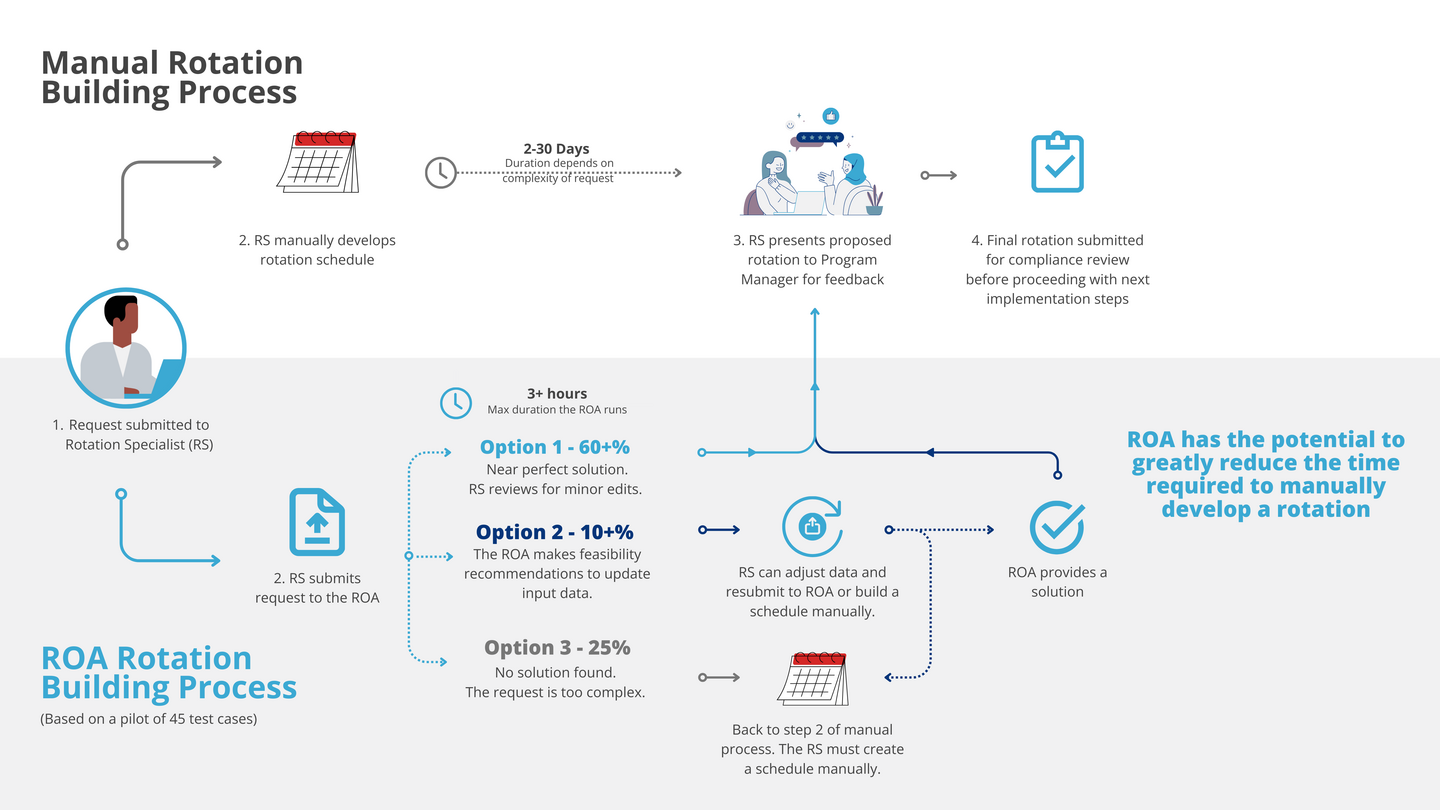Smart Scheduling: Using automation to create more equitable and efficient rotations, faster
Providence Health Care's ROA solution uses AI and automation to optimize staff scheduling, reducing manual effort by 80%, improving rotation efficiency, and enhancing healthcare delivery.
Innovation | Innovarium

The Rotation Optimization and Automation (ROA) Project
Project Initiators: Mehdi Ghotboddini and Nileshni Sharma
Impact: Streamlining staff scheduling processes, enhancing staff satisfaction, improving quality patient care, and reducing operational costs across the BC health care system
Providence Health Care (PHC) is reimagining staff scheduling with an innovative Rotation Optimization and Automation (ROA) solution. A collaborative effort by PHC’s Staff Scheduling and AI, Advanced Modeling and Optimization teams, the complex project began in spring 2022 starting with deeply understanding the problem at hand. After months of development, a pilot of 45 test cases took place in summer 2024 which showed very promising results. ROA is now in use by the Staff Scheduling team and results from real-world use cases will be shared in early 2025, with the aim to optimize the program based on user experiences.
By leveraging automation, ROA has the potential to reduce manual rotation development time by up to 80% by fulfilling over 50% of all rotation requests. This automated, data-driven tool has been designed to create optimal rotations by considering operational resource needs, staff preferences, equitability and collective agreement mandates. This solution is primarily intended to handle routine rotation requests, aiming to reduce backlogs and free up time so Workforce Optimization Specialists can focus their expert skills on the more complex rotations. Supported by the BC Ministry of Health Innovation Pathway Program, this PHC-built innovation underscores a commitment to modernizing health care delivery and improving operational efficiencies.
Challenge
Creating master rotation plans for health care staff has traditionally been a labour-intensive and time-consuming process. Inadequate rotations can hinder health care professionals’ ability to provide high-quality patient care, which in turn can show itself in overall morale at the point of care.
The rollout of minimum nurse-to-patient ratios (mNPR) emphasizes the need for efficient scheduling, and ratios for staffing levels intended to elevate standards in patient care. The ROA project is especially timely, as it aims to ensure staffing rotations are developed in alignment to the new standards.
Solution
The ROA project addresses these challenges through a comprehensive automation solution, with the pilot showing the potential to reduce the manual work required to develop master rotation plans. By allowing Workforce Optimization Specialists to explore various hypothetical scenarios, enabling leaders to collaborate in selecting rotations that best meet their needs while adhering to contractual agreements. ROA works to build rotating schedules with uncomplicated baselines according to collective agreement requirements.
Working in partnership with PHC Staffing Services, Mehdi Ghotboddini, Director of AI, Advanced Modelling and Optimization, proposed the received funding for the ROA initiative through the Ministry of Health Innovation Pathway Program, highlighting its significance: By automating rotation scheduling, we not only save time but also create a more balanced and fair working environment for our staff. This ultimately enhances the quality of care we can provide to our patients.

Impact
Even in its pilot stage, the ROA project's impact is promising. The pilot test, which began in June 2024, has shown a significant reduction in creation time for simple rotation requests, broadening the range of solutions available to the rotations team to utilize. The ROA pilot model successfully created rotations and feasibility options for over 70% of test requests received, creating a complete or starting base rotation for the Workforce Optimization Specialists to continue to develop.
In cases where no feasible solution could meet all mandatory requirements, the model is capable of proposing alternatives based on "what-if" scenarios. However, for 23% of requests, the model could not identify a solution within the time constraints, suggesting an incompatibility between input settings and shift requirements.
The ROA solution allows for enhanced capacity for communication, collaboration, and validation in serving PHC’s operational needs to ensure the quality and desirability of shifts. “ROA enables our team to prioritize critical requests, allowing us to allocate additional resources for enhanced support within the organization,” explains Manisha Gill, Workforce Optimization Specialist with PHC, “It also allows us to dedicate more time to addressing complex requests. We look forward to utilizing ROA towards Ministry Mandated initiatives and large organizational changes such as the new St. Paul’s project.”
As staff benefit from rotations with more options, the hope is that job satisfaction will continue to increase. While the ROA application continues to be refined and prepared for full-scale implementation, its potential for scalability across other health authorities in British Columbia is palpable. This project offers a forward-thinking approach to staffing solutions but also sets a precedent for operational excellence in the health care sector.
Looking ahead, Innovarium is committed to driving programs forward that will continue to expand and flourish at the new St. Paul's and the Clinical Support & Research Centre. Projects like these will be supported by state-of-the-art facilities and programming, fostering an environment where innovation and collaboration can thrive.
"At Providence, we’re committed to finding innovative solutions to complex problems that reduce administrative burdens and associated costs. ROA is a perfect example of how our teams collaborate, leveraging their expertise in staff scheduling and data modeling, to develop an application that significantly improves workflow.” Brian Simmers, CFO, VP Health Informatics, PHC and President, PHC Ventures
“The ROA solution is an intelligent, dynamic, and powerful tool; offering improved staffing support services to operations. Kudos and thanks to the analytics team.” Shiva Badiee, Executive Director, HR Systems Transformation, Strategic Recruitment & staffing
This project has been supported by Innovarium, Providence Health Care’s innovation engine that connects people, systems, infrastructure, and partners to accelerate health innovation.